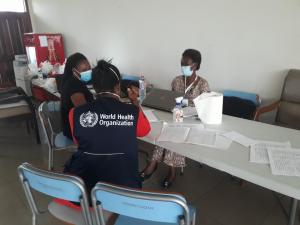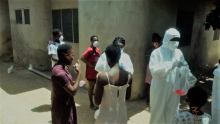Strengthening Contact Tracing for COVID-19 in Greater Accra Region
The confirmation of SARS coronavirus-2 in Accra, Ghana on 12 March 2020 was inevitable given the trend at the time in the Africa Region and the rest of the world. The outbreak spread to the rest of the country affecting all 16 regions. As at 30 September 2020, Ghana has recorded 46,222 cases with 299 deaths.
The good news was that when the first case was confirmed, the preparedness activities already initiated by the government of Ghana under the leadership of the President, His excellency, Nana Addo Dankwa Akufo-Addo, health authorities and partners transitioned into response mode. Strengthening early detection of cases for containment is a key activity under the surveillance response pillar. One of the strategies adopted was an expanded contact tracing system to identify contacts of confirmed cases of COVID-19.
The Greater Accra Region was (and remains) the region with the highest number of cases in Ghana. The Regional Health Directorate (RHD) and other agencies worked together to contain and prevent the further spread of the disease but were confronted with several challenges. In May 2020, one of the biggest challenges identified was lapses in contact identification, listing and tracing. This was as a result of rapidly increasing case numbers which placed a strain on human, financial and logistical resources to effectively trace all contacts. Contact tracing is a very important activity in controlling most infectious disease outbreaks. It allows for the identification, quarantine and close monitoring of persons who have been in contact with an infected individual. Delays in identifying contacts meant that, contacts who are not identified and followed to monitor for development of the disease and timely isolation have the potential to spread infection with resultant rapid amplification of the outbreak. Other challenges identified were underutilization of electronic surveillance data collection platforms due to over-reliance on paper-based data collection. This made data management for outbreak management very laborious.
The World Health Organization through the funding by the Norwegian Institute of Public Health (NIPH) provided technical and financial support to the Greater Accra RHD to augment efforts towards contact tracing, monitoring of field teams (contact tracers) and data management at district and regional levels. Contract tracers received a refresher trainer training and logistics (including transportation and call credits) for following up of contacts for the incubation period of 14 days. They were also trained on the use of the SORMAS (a data collection tool for outbreak response management and analysis) and provided with data to access and transmit data collected through electronic platforms. The support also enabled monitoring of activities by the contact tracing supervisors as well as district and regional level staff.
Through the implementation of these interventions, the number of new cases identified increased by 64% from 2,655 to 4,131 through tracing and collecting samples from over 18,000 contacts within a period of one month. All 2,655 cases were linked to care with about 65% enrolled into home care. Additionally, completeness of surveillance data into SORMAS and other electronic data collection platforms increased to between 88.5% and 95%. The support from the WHO coupled with the dedication of the health staff and the RHD led to the identification of many cases who would have been missed and further contributed to the spread of the virus. This has evidently led to the slowing down of the pandemic in the region. Furthermore, improved data collection and management has enabled RHD to receive real time data in order to make evidence-based decisions to control the outbreak.
While a lot of progress has been made, much more efforts and resources are required to sustain the gains made through these interventions. There is also the need to strengthen the implementation of infection prevention and control measures in health institutions as this is critical to prevent healthcare worker infections.
WHO’s support to the greater Accra Region was made possible through the Global Health Preparedness Programme (GHPP) of the Norwegian Institute of Public Health (NIPH) with funding from the Government of Norway.




